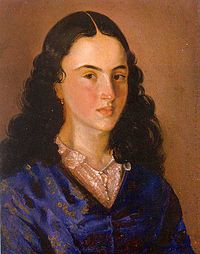Policarpa Salavarrieta
| Policarpa Salavarrieta | |
|---|---|

Heroine of the Colombian Independence Movement
|
|
| Born |
26 January 1795 Guaduas, Viceroyalty of New Granada |
| Died | 14 November 1817 Bogotá, Viceroyalty of New Granada |
| Resting place | Church of San Agustín, La Candelaria, Bogotá, D.C., Colombia |
| Nationality | Neogranadine |
| Occupation | Seamstress and spy |
| Parent(s) | Joaquín Salavarrieta Mariana de Ríos |
Policarpa Salavarrieta (c. 26 January 1795 – 14 November 1817), also known as "La Pola," was a Neogranadine seamstress who spied for the Revolutionary Forces during the Spanish Reconquista of the Viceroyalty of New Granada. She was captured by Spanish Royalists and ultimately executed for high treason. She is now considered a heroine of the independence of Colombia.
Because her birth certificate was never found, her legal given name is unknown. The name Salavarrieta is known only by the names her family and friends used. Her father referred to her as Apolonia in his will, which Salvador Contreras, the priest who formalized the testament on 13 December 1802, confirmed. She was closest to her brother, Viviano, as she became his de facto guardian when her parents died. When the armed forces in Guaduas started looking for her, she began calling herself Policarpa.
In her 1817 forged passport, used to get in and out of Bogotá during the Reconquista, she appeared as "Gregoria Apolinaria." Andrea Ricaurte de Lozano, whom Policarpa lived with, and officially worked for in Bogotá, as well as Ambrosio Almeyda, a guerrilla leader to whom she supplied information, also called her by that name. Her contemporaries referred to her simply as "La Pola," but Policarpa Salavarrieta is the name by which she is remembered and commemorated.
La Pola's date and place of birth are also subject to conjecture in the absence of legal documents. The popular version is that she was born in the municipality of Guaduas, Cundinamarca, between 1790 and 1796. However Rafael Pombo affirmed that she had been born in Mariquita, while José Caicedo Rojas confirmed it as Bogotá.
...
Wikipedia
